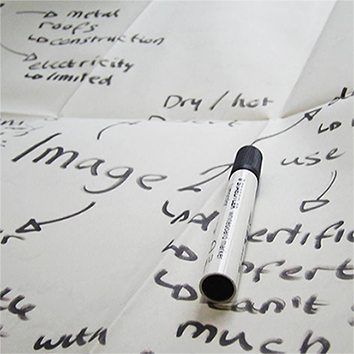An Audio-visual Approach to Teaching the Social Aspects of Sustainable Product Design
DOI:
https://doi.org/10.7577/formakademisk.1402Keywords:
Audio-visual resources, design education, product design, social sustainabilityAbstract
This paper considers the impact of audio-visual resources in enabling students to develop an understanding of the social aspects of sustainable product design. Building on literature concerning the learning preferences of ‘Net Generation’ learners, three audio-visual workshops were developed to introduce students to the wider social aspects of sustainability and encourage students to reflect upon the impact of their practice. The workshops were delivered in five universities in Britain and Ireland among undergraduate and postgraduate students. They were designed to encourage students to reflect upon carefully designed audio-visual materials in a group-based environment, seeking to foster the preferences of Net Generation learners through collaborative learning and learning through discovery. It also sought to address the perceived weaknesses of this generation of learners by encouraging critical reflection. The workshops proved to be popular with students and were successful in enabling them to grasp the complexity of the social aspects of sustainable design in a short span of time, as well as in encouraging personal responses and creative problem solving through an exploration of design thinking solutions.

Downloads
Published
How to Cite
Issue
Section
License
Authors who publish with this journal agree to the following terms:
- Authors retain copyright and grant the journal right of first publication with the work simultaneously licensed under a Creative Commons Attribution 4.0 License that allows others to share the work with an acknowledgement of the work's authorship and initial publication in this journal.
- Authors are able to enter into separate, additional contractual arrangements for the non-exclusive distribution of the journal's published version of the work (e.g., post it to an institutional repository or publish it in a book), with an acknowledgement of its initial publication in this journal.
- Authors are permitted and encouraged to post their work online (e.g., in institutional repositories or on their website) prior to and during the submission process, as it can lead to productive exchanges, as well as earlier and greater citation of published work (See The Effect of Open Access).
- The author(s) must manage their economic reproduction rights to any third party.
- The journal makes no financial or other compensation for submissions, unless a separate agreement regarding this matter has been made with the author(s).
- The journal is obliged to archive the manuscript (including metadata) in its originally published digital form for at least a suitable amount of time in which the manuscript can be accessed via a long-term archive for digital material, such as in the Norwegian universities’ institutional archives within the framework of the NORA partnership.
The material will be published OpenAccess with a Creative Commons 4.0 License which allows anyone to read, share and adapt the content, even commercially under the licence terms:
This work needs to be appropriately attributed/credited, a link must be provided to the CC-BY 4.0 licence, and changes made need to be indicated in a reasonable manner, but not in any way that suggests that the licensor endorses you or your use.



